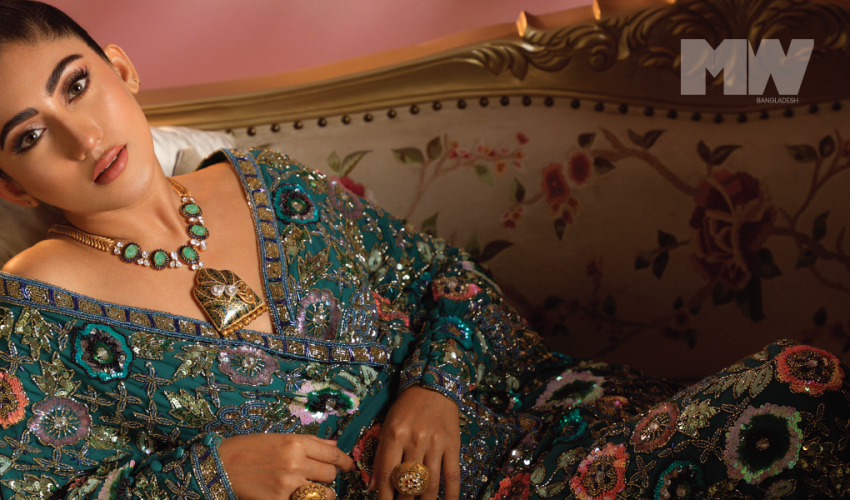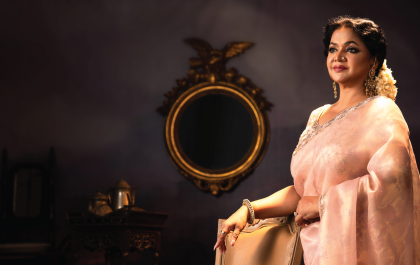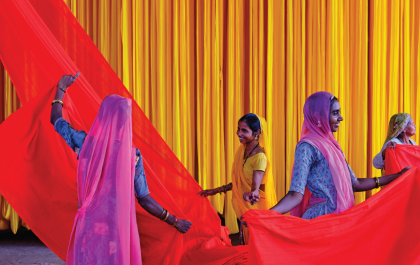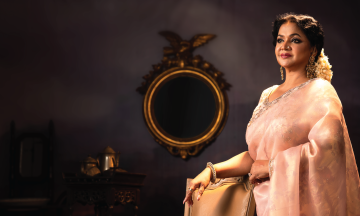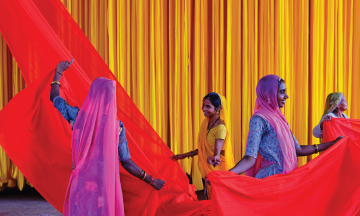The evolution of Safa Kabir
By Z Nawar
The name Safa Kabir can be said to be the first that immediately comes to mind when one thinks of an on-screen character or even an actress with a bubbly personality. Not only that, but the renowned actress’s sunny demeanor easily makes her an affable force in the way that she just might remind you of that one pleasant friend you can always reach out to. Recognized also unmistakably for her endearingly dimpled smile, Safa has managed to make a sturdy name for herself in the Bangladeshi entertainment industry having been around for around a decade.
Then again, akin to most journeys, hers was no bed of roses. From the outset, Safa Kabir found herself being consistently typecast until she took it upon herself to break the barrier for her own sake. She would get pigeonholed in roles of girlfriends or as a friend of the protagonists. Her relentless pursuit of better opportunities eventually struck her gold considering she is not only very well-known but she persistently works with the most sought-after filmmakers now. Her projects from a few years ago began showcasing all the potent acting aptitude she has yet to flaunt. Safa truly impressed audiences at large with Nishwas, Parul, Bed No 3 and Tikit, which came out this year.
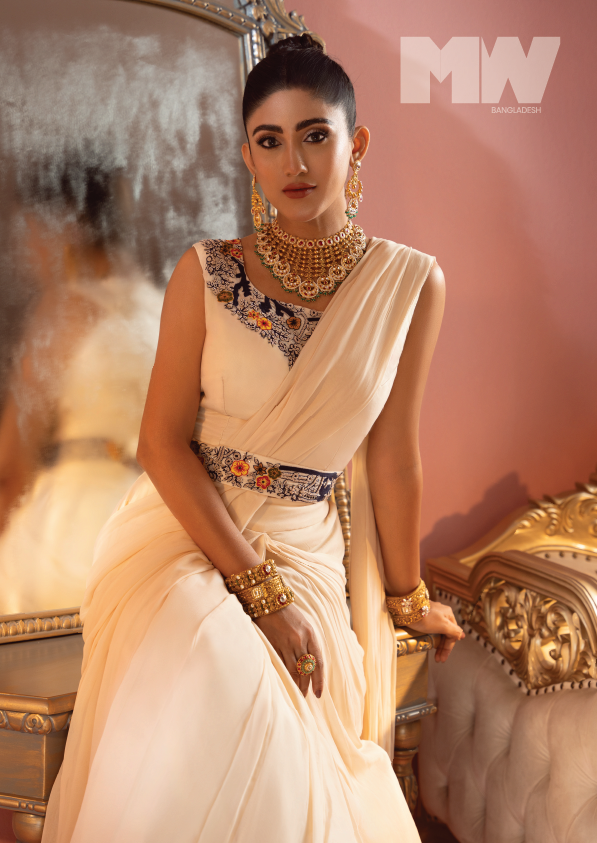
MW Bangladesh recently had a chat with Safa Kabir over the phone, in the wake of rave reviews of Tikit to learn more about her experience. Revealing that she will also be seen in several dramas throughout the Eid-ul-Fitr holidays alongside hinting at partnering up with two exciting brand deals, the actress opened up about a lot more.
You’ve said that you didn’t have any early ambition to become an actress, but the offers came, and you did it, and you’ve continued to do it so well and grow. What made you stay?
Yes, very true. It’s not that l was astutely against acting but I was completely unaware of the processes surrounding this profession. I couldn’t even imagine what acting would feel like. When I was met with my first opportunity, I appeared on TV through a telefilm. Subsequently, I worked steadfastly and closely with a telecom company for a good while. That job however required photoshoots which in turn would get my face on billboards. Now, it was at that point in time when I was captivated with billboards; the thought of seeing myself on them compelled me to say yes to working with the company. Once my face was out there, a diverse range of photoshoot-based job offers poured in too. I would gladly take on those projects because I definitely enjoyed modelling.
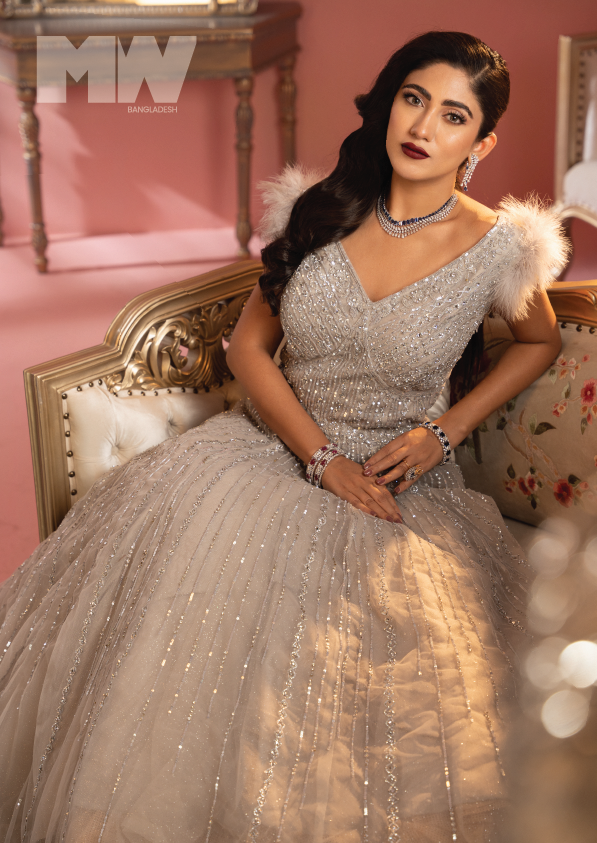
In terms of acting, I hadn’t given much thought to it then because I believed I used to talk in a babyish manner and that I couldn’t react or even act properly. My senior colleagues or acquaintances would however encourage me to act by exploring that avenue further. Redoan Rony in particular then called me in to discuss a project and I told him that I didn’t want to do it. When he asked why I didn’t want in, I simply said I can’t act. He then said something that I was inspired by. He said: “No one enters the industry having learned everything, they learn as they go. It’s like a school, the more you’ll work the more you’ll learn.”
I then chose to proceed with acting keeping his works in mind and I had to learn a lot since then. That journey itself, involving a personal race to feel accomplished within, made me fall in love with acting. I was also able to shift my mind and into trying out new opportunities instead of thinking “I can’t do it.”
Speaking of dreaming of seeing your face on billboards, can you take us back to the first time that the dream was fulfilled? What were you thinking at that moment? What would you like to tell Safa if you could?
It was a really good feeling. Seeing myself on a billboard did feel magical, moreover, I loved that a desire of younger Safa had found fruition. If I could go back in time then I’d tell myself to not worry much, because everything will be sorted out.
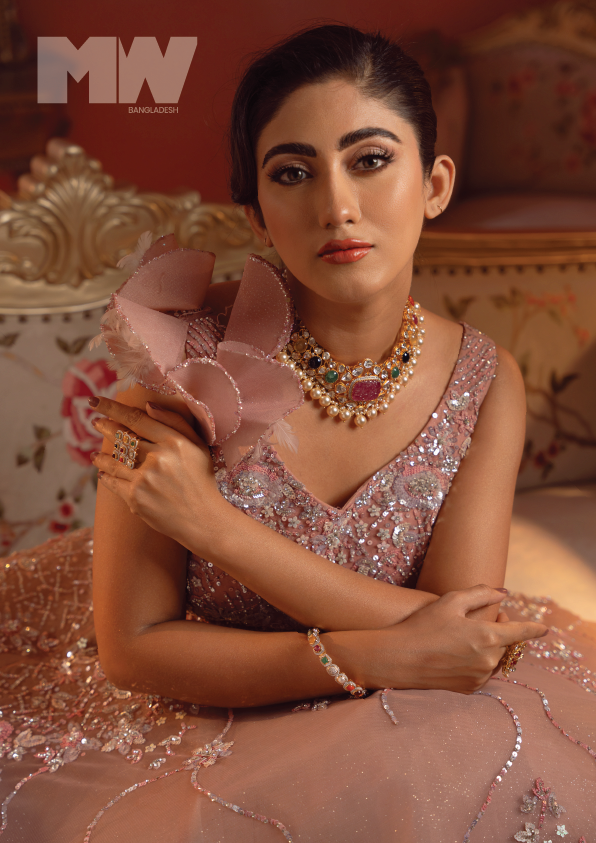
What dimensions did your experience as an RJ and model bring to your acting?
I wouldn’t say that they helped me much in acting. These three are very different routes. Then again, being an RJ helped me learn the process of staying connected to my fans. Since they love to show their appreciation, especially through Facebook, I used to read out the comments almost immediately as an RJ. It’s of course impossible to communicate with my fans on a one-to-one basis but being an RJ allowed me to not only effectively promote my work but genuinely remain in touch with my fans too.
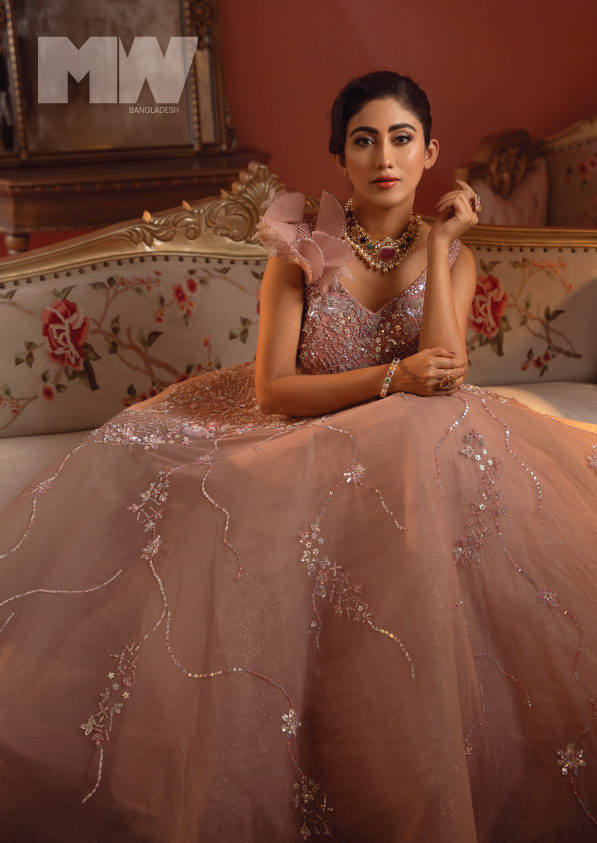
With your billboards, your ads, your radio presence, and your acting roles, you are arguably one of the most recognizable faces in Bangladesh. How do you handle the pressure of fame?
I’m a very positive person, so much so that I sometimes wonder where I find all of it. Having said that, I do love this aspect about myself including that I somehow manage to spread positivity too. The word pressure itself does have a negative connotation but I don’t focus on that. When a person has fans then those fans can easily become protective of the person and that is the norm and it adds to the fact that not everyone is supposed to be fans of every actor. I cherish my fans and that’s about it. On another note, the receival of appreciation from fans creates the pressure of having to do good work persistently and it will always exist.
As Selfie Girl and other similar roles you’ve played in your media campaigns, you’re something of a poster girl for the social media culture in Bangladesh. What is the best thing about the social media scene here, in your opinion?
I’d say that social media has made it possible for people to have a career. No one has to follow traditional paths to become a doctor, engineer, or even a government official anymore. Through social media, people have been able to create diverse opportunities for themselves. So I’d say it has been an overall positive addition here. But I must say that somehow individuals with a huge number of followers are perceived as influencers even though they aren’t technically influencers. In my case, I love interacting with my fans while also sometimes sharing a bit about myself with them, outside of letting them know which project they can expect to see me in. This equation might have stemmed from my fans’ demands but I like it because I do it for them and I even consciously share quotes or words that I find meaningful.
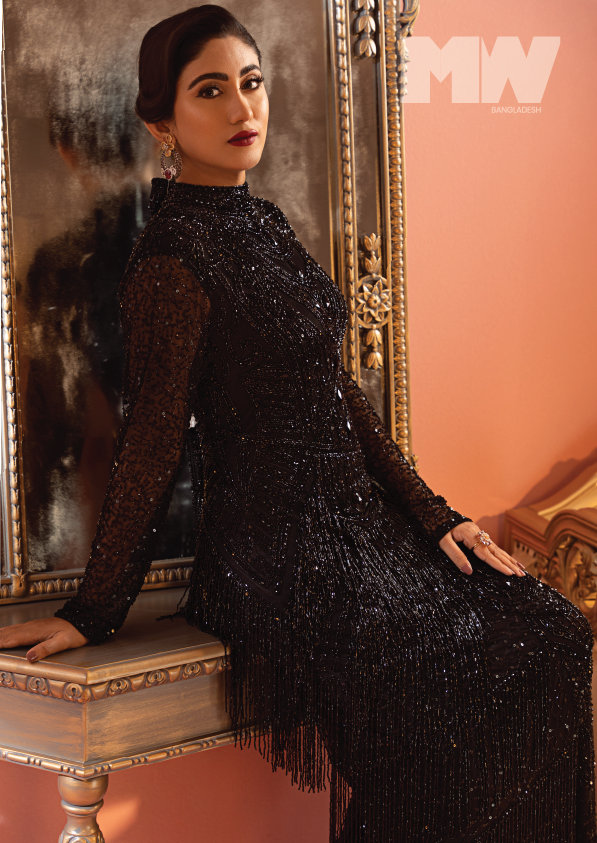
There’s also a dark side to social media and meme culture, as you have no doubt experienced. What do you do to protect your mental health when negative publicity happens?
The negative space can’t be blocked, it’ll exist. However, influencing people to be positive can be a measure and that’s not to say that it is an easy thing to do but perhaps someday, it will be. We can be hopeful. As for protecting myself, I can, and I continue to take care of myself very well. As a positive person, I would say that relaxation of the mind is equally as important as relaxation of the body. Mediation is great and thinking about the self from a third perspective, when it comes down to how you want to be seen, can count immensely. Whenever I have a bad day, I end up thinking that it is in me to find a way to get out of the unpleasant situation. I try to handle that bit with a clear head.
Let’s swing the focus back to your recent role and performance in Tikit. This was a side to Safa Kabir we have not experienced before, so well done! How did you prepare for this role?
Oh my god, it was really very difficult because Safa Kabir and Shuborna, the character in the web-series, have nothing whatsoever in common. Having to play such a drastically different person was tough. Then comes paying attention to all the tidbits about Shuborna, like her way of gazing in one specific direction for a prolonged time was difficult for me to get done. Since I have dry eyes, I can’t stare in a direction without blinking. I however still carried on staring, when filming, even when casual tears dropped down my cheeks. I had to additionally depict her manner of speaking and walking, wear her costume, showcase her likes and dislikes utilizing her charisma, and the heaviest part, her hair – I used to keep on wearing a wig that reached down to below my knees all day because she had long luscious black hair. I needed to get used to carrying the weight of the wig. Being Shuborna was hard but I loved being her and this character is undoubtedly close to my heart. The characters Parul and Dr Maha whom I’ve previously portrayed are also dear to me.
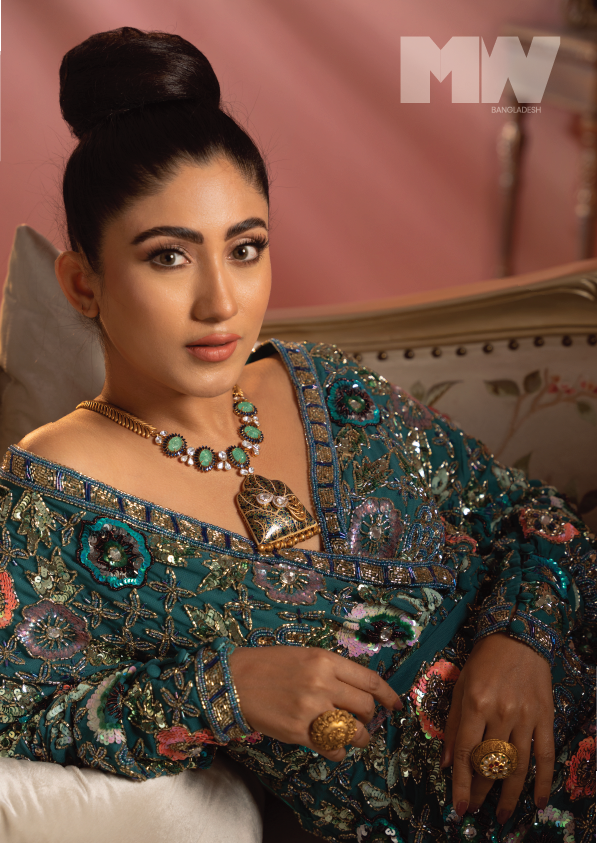
About the process of it all, Vicky Zahed bhaiya, the director of the series, has always had this belief in me to pull off unconventional characters. He in fact inspired and encouraged me to consider diverse projects. He has also allowed me opportunities to bring to life Dr Maha for Bed No 3 and now Shuborna for Tikit. A while ago he had actually pitched me the idea for Tikit and told me about Shuborna adding: “I think I can see her in you.” He had also warned me that I would have to do a lot of homework while discussing Shuborna’s look. Once during the dubbing section of the project, he asked to speak to me and I thought I had probably made a mistake since he never expressed anything outwardly when we were still filming. I was thinking the worst but he revealed that he was happy and proud of my work. He also said that he was letting everyone know how impressed he was with my performance. I was extremely happy that day.
You were evidently and unfortunately typecast for a long time. How were you able to break free?
That was another arduous journey. I have had to definitely surpass several stages throughout the voyage of my career. I am truly thankful to my directors who consciously chose to risk it by selecting me as the leading character. Vicky Zahed for instance saw me in roles no one else could’ve even envisioned. He also cast me in completely distinct characters every time we worked together.
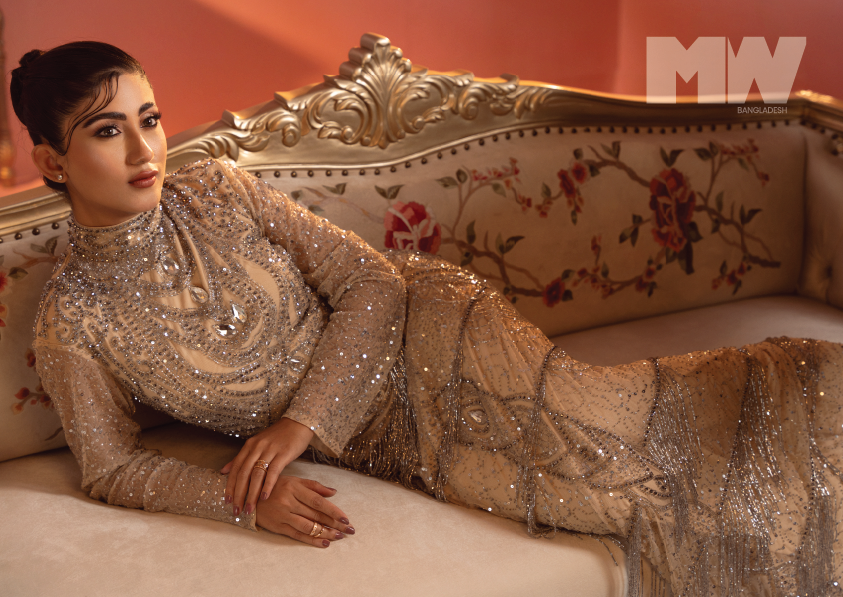
I strived to reach the point where I was finally getting offered to play the protagonists. To get there, I personally reached out to directors and asked to be considered for serious or mature roles when I was still playing the roles of one of the friends of the main character or the girl next door or the immature characters. Every step that I took over the course of my career was a level up. At the end of the day, my directors have been the ones who gave me the opportunities to work and present projects to the audience so I’m grateful to the ones who did give me work – including Ashfaque Nipun bhaiya, Bannah bhaiya, Rafat bhaiya.
You’ve also experimented with these unusual roles in Bed No 3 (also by Vicky Zahed) and Raihan Rafi’s Nishwas. What kind of role would you like to try next?
I would love to play a psychotic killer. I’m fascinated by the genre associated with the likes of them and I hope I get a call regarding a project with one.
What were some of your biggest lessons?
My life in the media as an actor has made me a better human being for sure. I got to experience a lot and meet even more people. I feel compelled to state it like this because comparatively during my childhood I was a completely different person. When I see where I’ve come, I can’t help but think so. I’m an only child and a girl on top of that so growing up I was extremely introverted and shy. I didn’t know how to communicate with others and I wasn’t expressive. I couldn’t even consider acting initially because of my inexpressiveness and as an actor, you absolutely need to be emotive. Today, I am still an introvert but I know how to get through to people. My journey opened me up to see the world, meet new people, and live a good life.
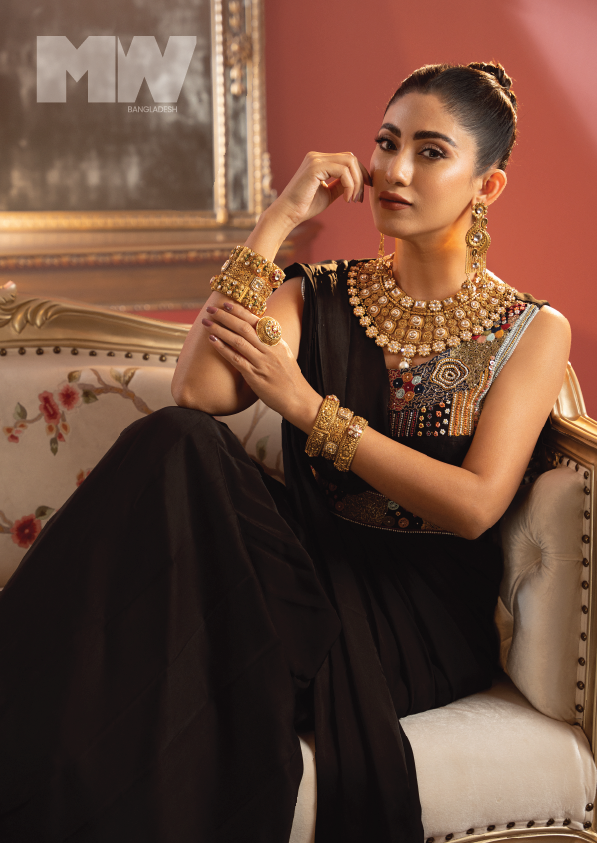
Introversion can become a hindrance for a lot of people, and the proper way to navigate in an overtly extroverted world is never really outlined for said people. So as someone who has successfully learned to get ahead of the curve what would be your advice to others like yourself?
My father taught me that I would receive exactly what I extend to others. For instance, if I were to give appreciation then I’d get the same back, in return. If I were to express hate then I’d get that back as hatred too. Over time I also grew to recognize that there are a lot of good people who were willing to be my friend if I just opened up to them. Besides if I hadn’t reciprocated their friendship or goodness then I would have only been the one missing out.
The people in the industry are very friendly and nice, and so that could’ve also pushed me to interact with people more.
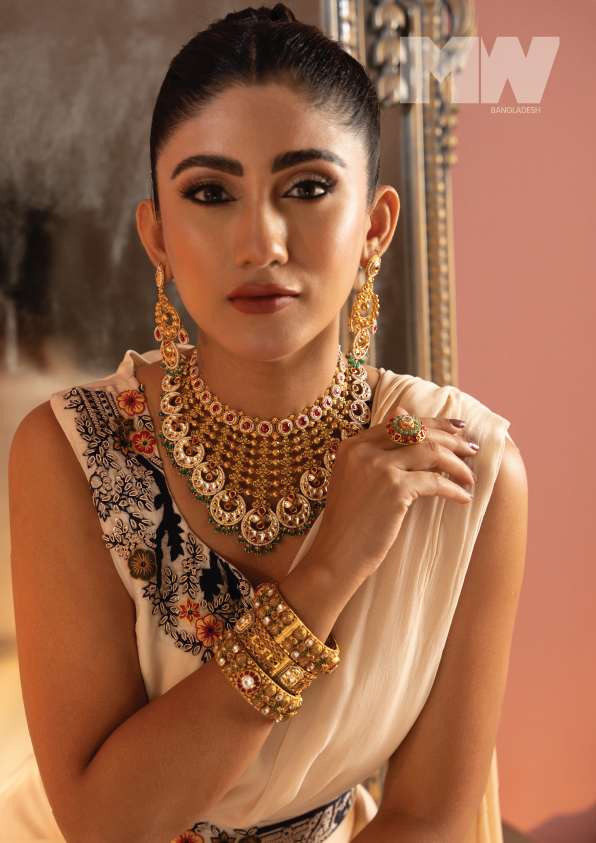
If you could go back to the beginning, what would you do differently?
If I had the knowledge that I do now, then I would have gone back to attempt things in a more organized and finer way. I’m self-made as I have had to learn everything and get to know everyone on my own. I would have been able to help my younger self steer my career more progressively with my accumulated and matured knowledge. Otherwise, I feel like I was just a baby when I started out and I don’t know how I could have matured more swiftly to get more work done.
As a female artist, which eventual changes in the industry have made you happy? And how can the industry better themselves as of right now?
I love that more and more female-centric projects are being made leaving behind productions that would showcase the female characters as weak or nasty. Our voices are also being heard while we are finally receiving the various awards properly too. When it comes to enhancing the media industry – we’re lagging significantly. For example, if we talk about the situation of our artists under the drama/natok category then we noticeably lack an artist management or artist team. We artists have to handle everything by ourselves, we have to negotiate our own budget and we have to take care of our own makeup and costume too, amongst other arrangements. The consideration of these missing factors can make the lives of artists easier.
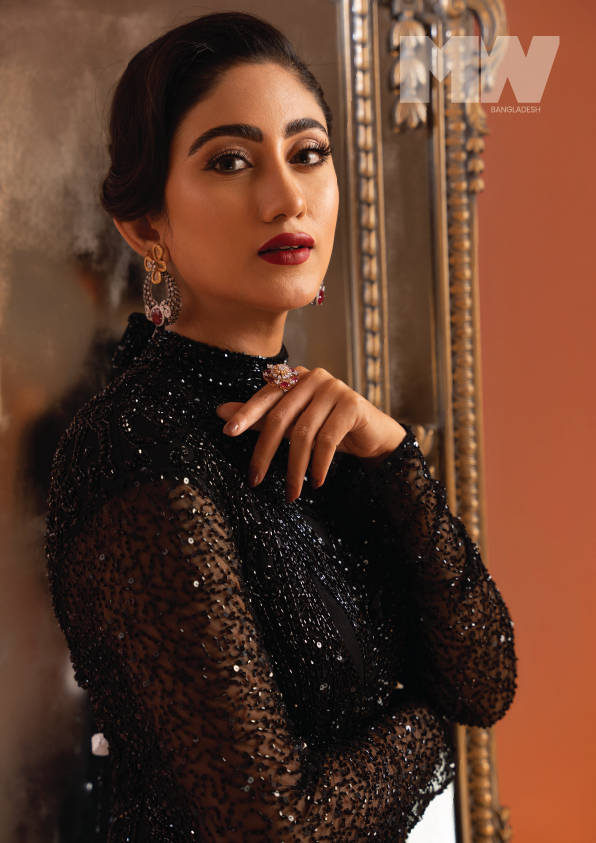
Budgets for productions across all platforms ought to be much higher. Production teams don’t even possess brand-new equipment that is already available in foreign industries. We need to be allowed global-standard facilities including some much-needed technical advancements so that our productions can touch the reach of the worldwide scale of production quality. We don’t even really own a large enough studio or film city. We still have to block certain roads and request passersby to cooperate with us and they do respect our plea. Nonetheless, these lackings can hamper production for us and might end up having to compromise on shots or scenes. I think it can all be solved if our industry manages to expand on a large scale if hopefully, more money comes in. I can see light at the end of the tunnel for us but we are still not there.
What about the industry are you inspired by, for now?
The fact that our projects are really trying to represent Bangladesh is inspiring. I also love that we Bangladeshi people have the fire to want to work. I feel proud and inspired by those who try to do better and be better by learning.
Are there Bangladeshi directors with whom you haven’t collaborated but are eager to do so?
There are actually a lot of directors I would be thrilled to work with. I haven’t worked with Rehana Maryam Noor’s Saad bhaiya, Shawki bhaiya, Farooki bhaiya, Tanim Noor bhaiya, and even Selim bhaiya. I am definitely looking forward to working with them.




